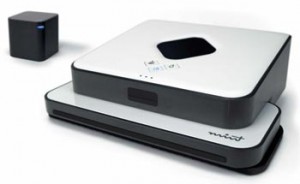 Let’s go back in history to a time without global positioning systems (GPS) helping you navigate to your favorite sushi bar. Sometime around 2004, Qualcomm announced they successfully tested assisted GPS on a mobile phone after acquiring the technology from SnapTrack. Now, every mobile smart phone and device takes advantage of GPS. Let’s fast forward to a time when you arrive in a large shopping mall and you need to find a path to your favorite store. Well its back to using a printed map to find your path through the mall. Luckily, many researchers around the world are working hard on a solution to indoor positioning for mobile devices. ETH Zurich provided an in-depth comparison between Infrared , cellular – Wi-Fi networks and acoustic waves for triangulation of a position. The robotics industry has also produced a robot vacuum (Mint shown at left) capable of tracking an infrared beacon on the ceiling as a suitable indoor GPS module.
Let’s go back in history to a time without global positioning systems (GPS) helping you navigate to your favorite sushi bar. Sometime around 2004, Qualcomm announced they successfully tested assisted GPS on a mobile phone after acquiring the technology from SnapTrack. Now, every mobile smart phone and device takes advantage of GPS. Let’s fast forward to a time when you arrive in a large shopping mall and you need to find a path to your favorite store. Well its back to using a printed map to find your path through the mall. Luckily, many researchers around the world are working hard on a solution to indoor positioning for mobile devices. ETH Zurich provided an in-depth comparison between Infrared , cellular – Wi-Fi networks and acoustic waves for triangulation of a position. The robotics industry has also produced a robot vacuum (Mint shown at left) capable of tracking an infrared beacon on the ceiling as a suitable indoor GPS module.
Researchers in Germany from the Ars Electronica FutureLab Linz have developed a radio tracking system for autonomous multi-rotor vehicles. Instead of the 5 meter accuracy of outdoor GPS, the indoor radio tracking system can provide close to 5-15 centimeters of accuracy. Companies like Cambridge Consultants have also released a circuit board for a indoor tracking system to integrate to a phone. Many of today’s smart phones have the necessary sensors such as accelerometers, gryoscopes and magnetometers to do precise position tracking. However, phones would need an absolute positioning marker to get a reference similar to how GPS obtains waypoints. Luckily, big companies like Google are working on a series of absolute positioning maps for buildings. To date, Google has released 10,000 floorplans for buildings all around the world. The future is looking bright for indoor position tracking with many major industry players stepping up to the plate. However, it will be a few years before accurate indoor positioning hardware begins to creep into mobile devices. For now, robots and researchers will lead the charge on this important technology.